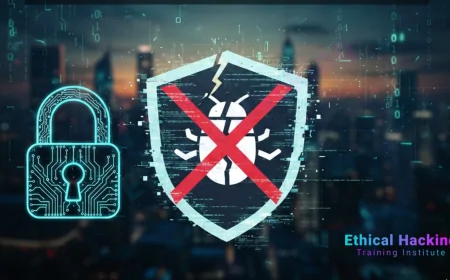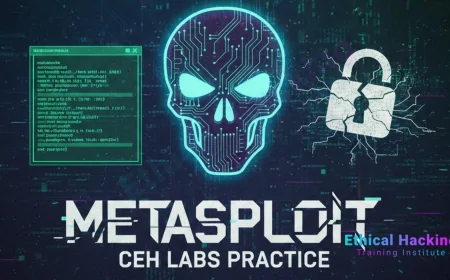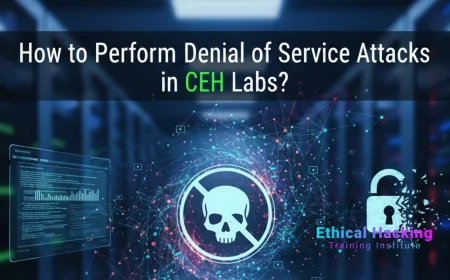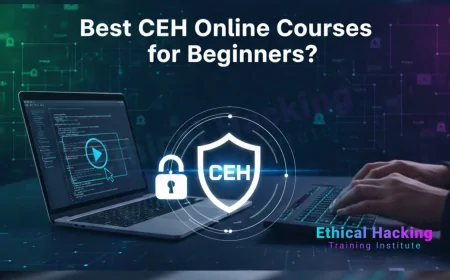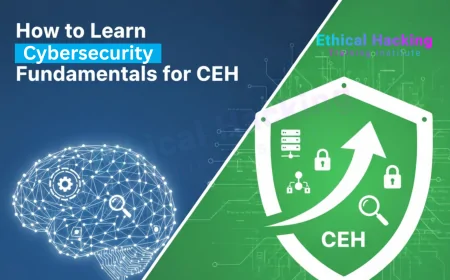Ethical Hacking Courses with Placement: How to Land Your Dream Cybersecurity Job | Placement-Focused Ethical Hacking Courses to Launch Your Career
Discover top ethical hacking courses with placement support. Learn how to land your dream cybersecurity job with the right training, certifications, and career guidance. Perfect for beginners and professionals aiming to enter or advance in ethical hacking.

Table of Contents
- Introduction
- Market Demand & Career Outlook
- Why Choose Courses with Placement
- Top Course Providers with Placement
- Curriculum & Tools Covered
- Hands-On Labs & Capstone Projects
- Certifications & Credentials
- Job-Prep & Interview Assistance
- Career Paths & Salary Expectations
- How to Choose the Right Course
- FAQs
- Conclusion
Introduction
Cybersecurity threats are growing, making skilled ethical hackers essential to protect organizations. Many learners now seek training programs that not only teach hacking skills but also provide placement support to land their first cybersecurity job. In this guide, we explore top ethical hacking courses with placement assistance and share how to choose the best program to launch your dream cybersecurity career.
Market Demand & Career Outlook
Demand for ethical hackers and SOC analysts continues to rise—cybersecurity roles projected to grow 31% through 2029. Entry-level salary in India ranges between ₹4–15 LPA, with senior roles reaching ₹30 LPA+.
Why Choose Courses with Placement Support?
- Guaranteed Interviews: Institutions partner with 300+ employers (e.g. IEC Pune) and offer 85%+ placement success.
- Job-Readiness: Resume prep, interview training, and demo interviews help new entrants become job-ready.
- Strong Networks: Direct hiring channels through alumni and recruiters.
- Structured Outcomes: Completion ensures a clear path to employment—essential in a competitive field.
Top Course Providers with Placement Assistance
Trusted training providers offering placement-backed ethical hacking courses include:
- WebAsha Technologies : combines technical training with reliable placement support for career success.
Curriculum & Tools Covered
Quality programs cover:
- Footprinting, scanning, enumeration, vulnerability analysis
- System and web app hacking, wireless, IoT, cloud security
- Malware analysis, social engineering, cryptography
- Tools: Key tools covered include Nmap, Wireshark, Metasploit, Burp Suite, and Kali Linux.
Hands-On Labs & Capstone Projects
- Real-world labs via EC-Council iLabs, virtual ranges, and live-case handson.
- Capstone assessments to showcase skills in portfolios
- CTF-style projects, vulnerability testing, and hacker simulations
Certifications & Credentials
Courses often prepare you for:
- EC-Council CEH (theory + optional practical).
- OSCP prep via advanced labs.
- CompTIA Security+/Network+, SANS SEC courses.
Job Preparation & Interview Support
Effective programs include:
- Resume & LinkedIn optimization
- Mock interviews by industry professionals
- Access to hiring networks (e.g. IBM, Accenture, Microsoft).
- Soft-skill workshops: behavioral, communication, leadership
Career Paths & Salary Expectations
Graduates can pursue roles such as:
- Penetration Tester, Security Analyst, SOC Engineer
- Security Consultant, Forensics Analyst, Red Team specialist
- Starting salaries range from ₹4–15 LPA—rising sharply with experience.
How to Choose the Right Course
- Verify placement assistance & employer partnerships
- Look for EC-Council accreditation or alignment
- Ensure labs and mentor support are included
- Check alumni success and company hiring lists
- Prefer programs offering practical experience and soft-skills training
FAQs
1. What is an ethical hacking course with placement?
A course that includes both skill training and job support like resume prep, interviews, and employer connect.
2. Do all courses guarantee jobs?
No—look for transparency on placement outcomes and employer partnerships.
3. How much practical lab exposure is typical?
Top providers offer 200+ lab hours including virtual and instructor-led environments.
4. Is CEH necessary for placement?
CEH is widely accepted. Others like OSCP and Security+ add credibility.
5. What salary can I expect post-course?
Entry-level ₹4–15 LPA in India; experienced roles ₹30 LPA+.
6. Can non-IT backgrounds enroll?
Yes—many courses welcome beginners with basic network understanding.
7. How long do these programs last?
Typically 3–6 months, depending on full-time vs part-time delivery.
8. Is placement support effective?
Yes—with proper mentorship, networking, and practice, placement rates of 80–90% are possible.
9. Are live labs included?
Most quality programs include cloud-based virtual labs and guided exercises.
10. Do they prepare for interviews?
Yes, through mock sessions, HR prep, and soft-skill coaching.
11. What tools do I learn?
Nmap, Metasploit, Burp Suite, Wireshark, Kali Linux, among others.
12. Are courses self-paced?
Some are self-paced; many offer hybrid or instructor-led formats.
13. Is OSCP harder than CEH?
OSCP is more technically demanding and lab-intensive.
14. Can placement fail?
Yes—placement depends on your project quality, resume, and effort.
15. Is certification included?
Yes—most programs include CEH, Security+, OSCP or EC-Council credentials.
16. How much does it cost?
Ranges from ₹50k–3 L, depending on course and perks.
17. Can I work remotely?
Yes—cybersecurity roles often support remote work.
18. Do these courses offer job updates?
Yes—many maintain pipelines with companies like IBM, TCS, Microsoft.
19. What if I fail certification?
You can retake courses and exams—programs often support repeated attempts.
20. How can I choose wisely?
Check accreditation, lab access, placement stats, alumni feedback, and tool proficiency.
Conclusion
In a competitive cybersecurity job market, ethical hacking courses that include placement support provide a robust avenue to secure a dream job. By choosing programs that combine structured curriculum, hands-on labs, recognized certifications, and job-readiness tools, you significantly improve your chances of starting a successful cybersecurity career. Evaluate providers carefully, align with your goals, and pursue your passion—your cybersecurity journey starts here.
What's Your Reaction?
 Like
0
Like
0
 Dislike
0
Dislike
0
 Love
0
Love
0
 Funny
0
Funny
0
 Angry
0
Angry
0
 Sad
0
Sad
0
 Wow
0
Wow
0
